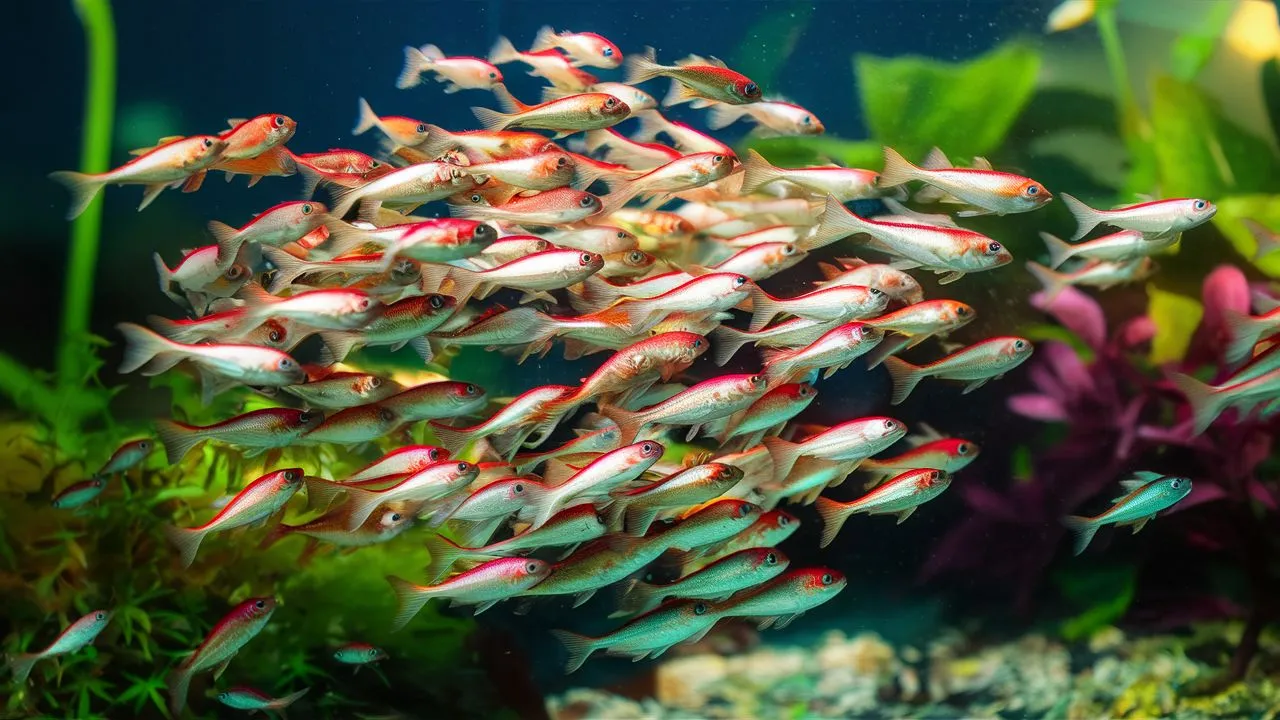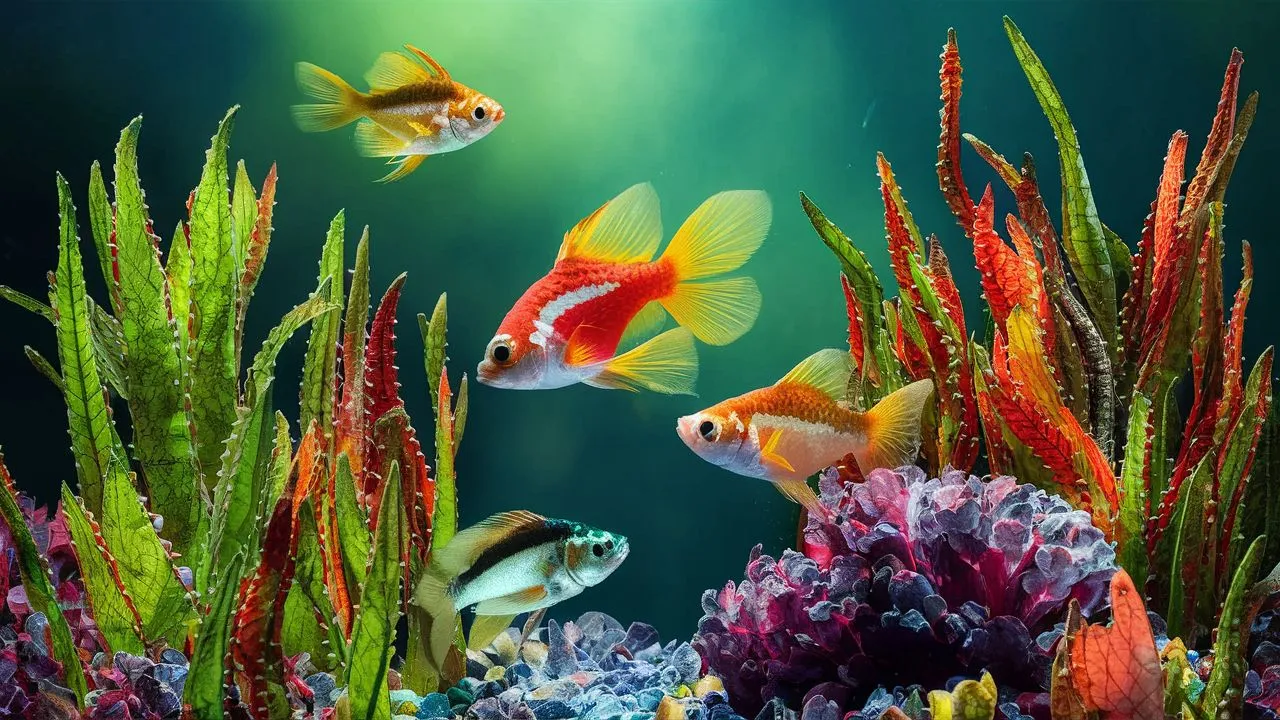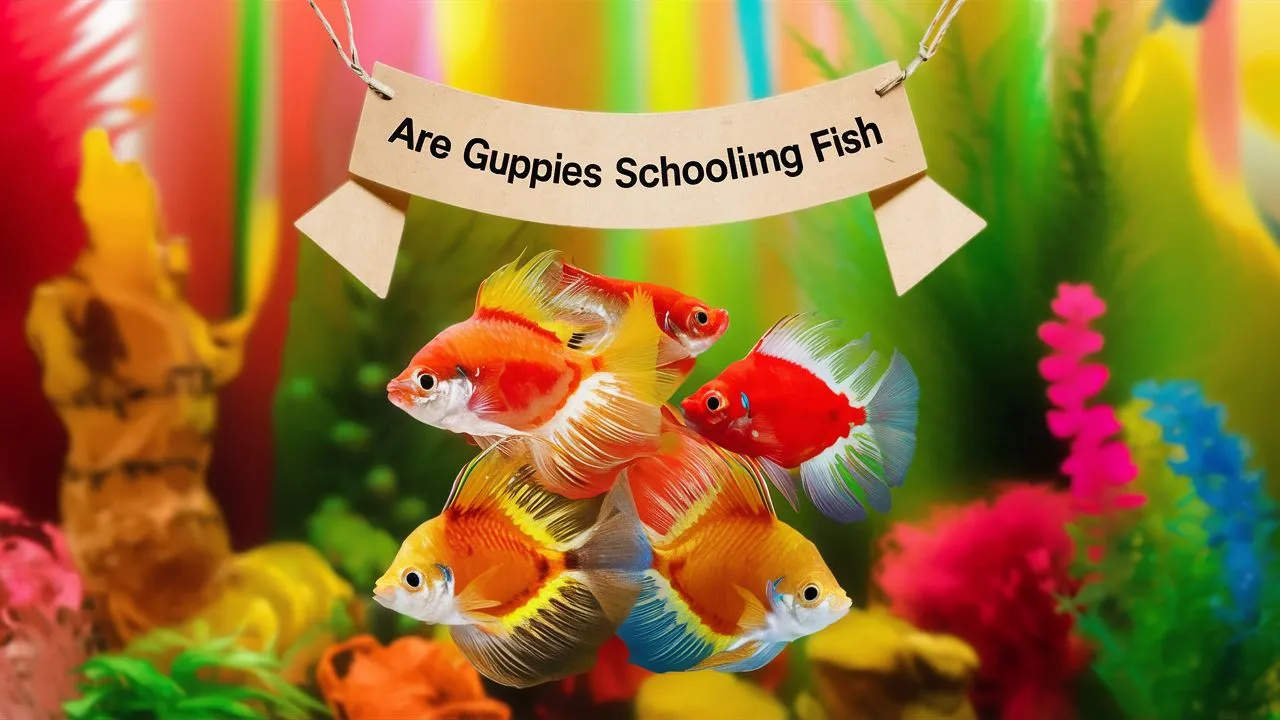Yes, guppies are schooling fish, but they also shoal. Schooling is when they swim together in a tight and coordinated formation, usually to avoid predators.
Are Guppies Schooling or Shoaling Fish?
Depending on the situation, guppies can be both schooling or shoaling fish. When they swim in a close-knit group during schooling, it’s mainly to avoid predators. When they swim together in a loose, social group—typically for protection and companionship—this is known as shoaling. Although guppies are mostly shoaling fish, they can also school when they sense danger.
Fish behave in two different ways schooling and shoaling. When fish school, they move in together, in the same direction, and at the same speed. Fish that are involved with shoaling stay in social groups but swim more independently.
Schooling fish do this to avoid predators, improve their ability to feed, or increase their chances of breeding. Fish that are shoaling do this for communication, companionship, or protection.
Why do Guppies school or shoal?
Guppies school or shoal for different reasons, depending on the situation. Some of the benefits of grouping behavior in Guppies are:
- Defence against predators: By staying together, Guppies can reduce the risk of being singled out by a predator. They can also confuse or deter predators with their collective movement and size
- Improved foraging: By swimming together, Guppies can cover more area and find more food sources. They can also share information and learn from each other’s feeding strategies
- Increased mating chances: By forming groups, Guppies can attract more potential mates and increase their reproductive success. They can also benefit from the genetic diversity and social selection of the group
- Hydrodynamic efficiency: By synchronizing their swimming, Guppies can reduce the drag and energy expenditure of their movement. They can also take advantage of the slipstream and pressure waves created by the leading Guppies.

How Many Guppies Should There Be In A School?
For optimal behavior and stress levels, it is recommended to keep a minimum of 5-6 guppies in a tank. These social fish enjoy being in groups and can be kept in a 10-gallon tank with snails or shrimp for clean up.
For a 20-gallon tank, 10-15 guppies is recommended for healthy behaviors and water quality. For larger tanks, 15-20 guppies allows enough swimming space while maintaining schooling.
Guppies thrive in odd numbers, such as 7 or 9, to reduce stress from dominance hierarchies. A general guideline is 2-3 gallons of space for guppies, but more space is always better for healthy, active fish.
Advantages of Schooling for Guppies
Some of the advantages of schooling for guppies are:
- Protection from predators: By swimming in a large school, guppies can reduce the risk of being singled out by a predator. They can also confuse or deter predators with their collective movement and size
- Improved foraging and feeding efficiency: By swimming together, guppies can cover more area and find more food sources. They can also share information and learn from each other’s feeding strategies
- Increased mating chances: By forming groups, guppies can attract more potential mates and increase their reproductive success. They can also benefit from the genetic diversity and social selection of the group
- Social communication and learning: Guppies are social creatures, and schooling provides them opportunities for social communication and learning. When guppies school together, they interact with one another and develop social hierarchies. This hierarchy helps maintain order within the group and reduces aggression and competition
Disadvantages of Schooling for Guppies
Schooling is a behavior that guppies use to avoid predators or other threats. They swim together in a tight and coordinated formation to create the illusion of a larger organism.
However, schooling also has some disadvantages for guppies, such as:
- Increased visibility: By swimming in a large school, guppies may attract more attention from predators or competitors. Some predators may follow the school and wait for an opportunity to attack the weaker or slower guppies1
- Competition for resources: By swimming in a school, guppies have to share the same food sources and space with other guppies. This can lead to competition, aggression, and stress within the school. Guppies may also have less access to oxygen and water quality if the school is too dense
- Loss of individuality: By swimming in a school, guppies may lose some of their individual traits and behaviors. They may conform to the group’s movement and direction, and not explore their own preferences and interests. They may also have less opportunity to mate with their desired partners, as they have to follow the school’s mating rules
Will Guppies School With Other Fish?
Guppies will not school with other fish, but they will shoal with them. Schooling is when fish swim together in a tight and coordinated formation, usually to avoid predators. Shoaling is when fish swim together in a loose and social group, usually for companionship and protection. Guppies are mostly shoaling fish, but they can also school when they feel threatened
Guppies will only school with other guppies of the same species, size, color, and shape. They will not school with different types of fish or different species of guppies. However, they can shoal with other peaceful fish such as cardinal tetras, Cory catfish, harlequin Rasboras, Honey gourami, Barbs, nerite snail, and danios. They can also shoal with other guppy varieties of the same species
Why Guppies Don’t School in My Tank?
Guppies don’t school in your tank because they feel comfortable and safe. Schooling is a behavior that guppies use to avoid predators or other threats. They swim together in a tight and coordinated formation to create the illusion of a larger organism. Shoaling is a behavior that guppies use to socialize and communicate with each other. They swim together in a loose and irregular group, but they are not synchronized or aligned. Guppies are mostly shoaling fish, but they can also school when they feel threatened
If your guppies don’t school in your tank, it means that they don’t perceive any danger or stress from their environment or tank mates. This is a good sign that your guppies are healthy and happy. However, if your guppies suddenly start to school, it may indicate that something is wrong. You should check your water parameters, temperature, oxygen levels, and other fish for any signs of problems
What is the best tank size for guppies?
The best tank size for guppies depends on how many guppies you want to keep and whether you plan to breed them or not. A general rule of thumb is to have one gallon of water for every inch of guppy. Adult guppies are about 1.4 to 2.4 inches long, so you need about 2.5 gallons of water per guppy. You should also keep a ratio of 2 females to 1 male to avoid overbreeding and stress.

Some sources suggest that the minimum tank size for guppies is 5 gallons, which can house three guppies comfortably24. However, this tank size is not suitable for breeding or adding other fish species. A 10-gallon tank can accommodate five guppies, but it is still quite small and may require frequent water changes and maintenance.
The ideal tank size for guppies is 40 gallons, which can house a fair number of guppy fish along with other guppy compatible fish. This tank size allows the guppies to swim freely and play without overcrowding or competing for resources. It also provides enough space for decorations, plants, and filtration systems. A 40-gallon tank is also practical for those who want to breed guppies or are not sure how to measure the length of each guppy
Coclusion
Guppies are known for their schooling behavior, which involves swimming together in a coordinated manner. This behavior provides benefits like increased protection against predators, better foraging opportunities, and improved social interaction. Guppies form tight-knit groups, synchronizing their movements and maintaining close proximity. However, individual variations can occur due to environmental conditions, population density, and genetic predispositions. Regardless, guppies are social creatures that form schools.
